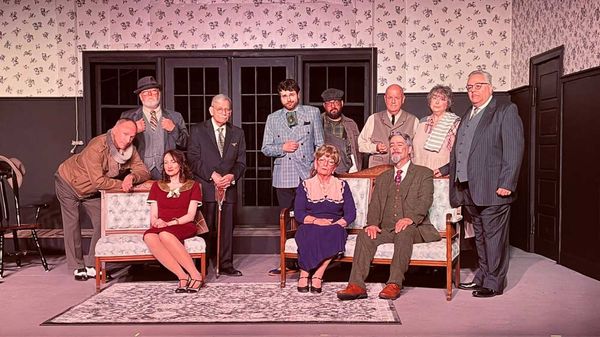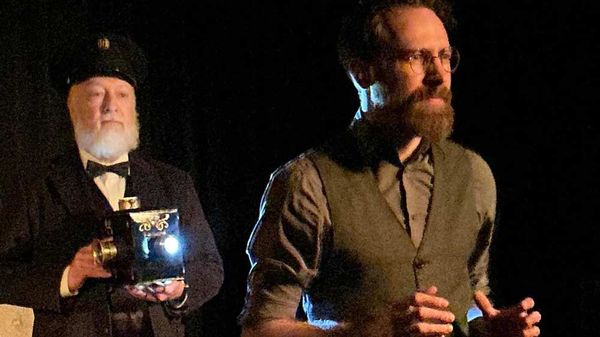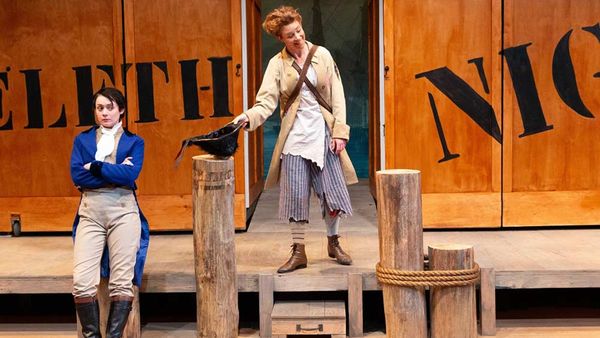November 29, 2011
Baby Doll
Kevin Mark Kline READ TIME: 5 MIN.
There's a kind of magic at work in Joel Daavid's retelling of Tennessee Williams' Baby Doll at the Elephant Theatre Company.
Daavid has merged elements of the film Baby Doll with its source material, Williams' seldom produced (though often read and studied) one-act, 27 Wagons Full of Cotton. He has also infused the proceedings with a sensibility that while filmic in nature is wildly theatrical. Music, sound effects, smells, smoke, lighting, and the underlying menace of racism and misogyny don't just draw you in, they tug at you, pulling you in whether you want them to or not.
Even as parts of the text seem emotionally muddled, the acting approaches varied, and the accents seemingly from different areas of the South, there is a single-mindedness of purpose that weaves even the more disparate bits into an evening of powerful cohesion.
Part of Daavid's triumph lies in the balance of his attention.
His dreamy, creative approach to the staging includes opening with ensemble characters being released from clothespins that hold them still and silent. It's a metaphor that with one misstep might have felt arch or even pedantic. I frankly didn't want to like it. But I did. Very much.
On the other hand, sometimes directors with big ideas give short shrift to performance specifics. Or they can give little care to things like hair, costumes, and make-up-as if it's somehow beneath the manly man concerns of the Big Vision. (To give a mainstream example, think of how Michael Bay is great with spectacle and doesn't seem to care much about individual actors or the minutia of plot.)
Joel Daavid cares about it all.
His boldest risk is in the treatment of Baby Doll herself, played by Lulu Brud. He declines to make her a victim. I don't know how Tennessee Williams would have felt about that, but for me, it makes her far more interesting.
When the film opened, the lurid images of Carroll Baker almost pornographically spread out in a crib helped propel it into an almost mythic notoriety. Time Magazine called it "Just possibly the dirtiest American-made motion picture that has ever been legally exhibited."
The film softened the idea that Baby Doll is retarded. But it still made her into a blobby, masochistic girl-woman of limited intelligence, married to Archie, a grinning bully who drools and beats her as he awaits the day their arranged marriage can be consummated.
She'll be twenty years old in a few days and that's the agreed upon terms of finally doing the deed. Baby Doll, however, believes she has solid grounds to overturn the agreement-since Archie hasn't kept her in the style she deserves-which amounts to a plentiful supply of Coca Cola and a house full of furniture bought on time from the Ideal Pay as You Go Furniture Company, that is repossessed.
The plot is deceptively simple. Archie is not just sexually frustrated, he is also headed for the poorhouse because his cotton gin business has been made obsolete by a syndicate run by an Italian immigrant, Silvan, played by Ronnie Marmo. (Very Occupy Wall Street in a funny way.)
So Archie burns down the syndicate's machinery.
Much of the play is taken up with whether Archie can get Baby Doll to lie about his whereabouts, and conversely, whether Silvan can terrorize her into admitting the lie.
In both the film and in the text of the play, I don't believe for a minute that Archie would imagine he could get Baby Doll to successfully provide his fake alibi. She is too stupid, especially in the play, to hold the fictional narrative of the lie in her head-even if she wants to-though she probably doesn't, since telling the truth will not only hang Archie, but also bring on the fearsome punishments from him she seems perversely to crave.
Brud has a mean, hardscrabble look that works. She torments both men in her own way. (Actually, and horribly inappropriately, at one point in the action, the song Torn Between Two Lovers kept going through my head-but as Torn Between Two Rapists. Sorry.)
The fact that I was kind of rooting for Silvan to catch her disturbs me. In a good way. Ronnie Marmo has a terrific Italian accent and he's pretty dishy to boot. With his lilting voice, and incessant, weirdly gentle-but-brutal pursuit of Baby Doll, complete with a riding crop, he is certainly a preferred alternative to the sweaty, perpetually drunk Archie.
When he undoes his pants to tuck his shirt in, right in front of her, it's so manipulative and erotically charged-you don't want it to be hot but it is. She craves his attention, and ends up giving herself willingly, with a measure of odd affection and hope.
Which is exactly what Baby Doll is about-the grubby messiness of our own conflicts and kinks.
I do wish Tony Gatto were more nuanced in his approach to Archie. The trap of the role is in its inherent demand that he be a great big lout of a man. But he doesn't have to be a boob.
Gatto is more successful once he becomes aware that Silvan has slept with Baby Doll. This is where he forces himself to put his thwarted, outsized sexual needs and humiliation aside and neuters himself on the altar of avarice.
The rest of the cast, especially the ensemble, is terrific, though I don't really know what Baby Doll's Aunt Rose, played by Jacque Lynn Colton, is meant to bring to the party. Colton is excellent, and gives her a Jane Darwell/Ma Joad look and feel, coupled with a kind of Little Foxes Aunt Birdie vibe.
She is desperate and funny, particularly in the bits about her visiting a dying friend at the hospital just so she can eat the woman's candy.
But as the plot careens to its inevitable conclusion, Rose is suddenly, improbably, thrust into the action-as if she is of far more importance to Baby Doll than she seems to be during most of the play.
Nick Block's score, Matt Richter's sound design, and Noelle Raffy's costumes, are first rate. They come together to form a whole world-maybe not a world any of us would care to live in-but one that is as fully realized as it is lyrical, giving us reality in a town drenched in poetry.
The play is meant to be, in Williams' words, a "Mississippi Delta Comedy." Joel Daavid ends it as tragedy, and I'm fine with that. In Tennessee Williams' universe-actually, in life itself-comedy and tragedy are sometimes pretty much the same thing anyway.
Baby Doll runs through December 18 at the Lillian Theatre, 1076 N. Lillian Way (just west of Vine, off Santa Monica Boulevard), in Hollywood, 90038. Street parking is available. Fridays and Saturdays at 8 pm and Sundays at 7 pm.
Reserve online at www.plays411.com/babydoll or elephanttheatrecompany.com, or call (323) 960-4420.







